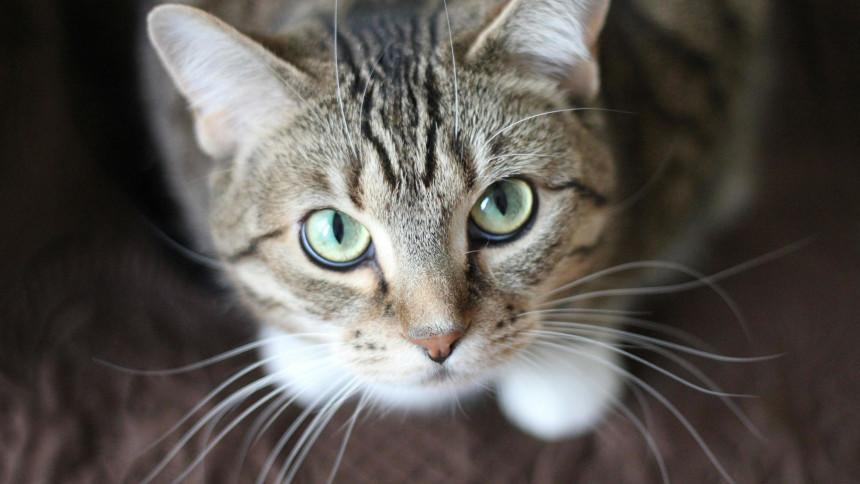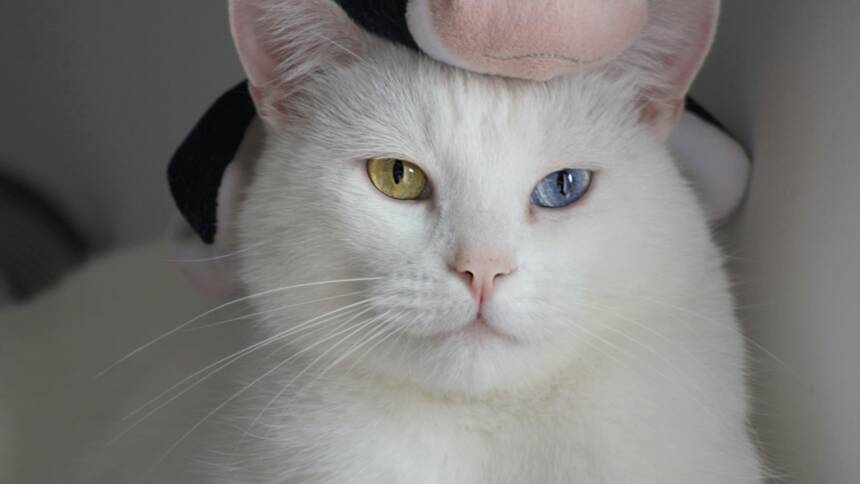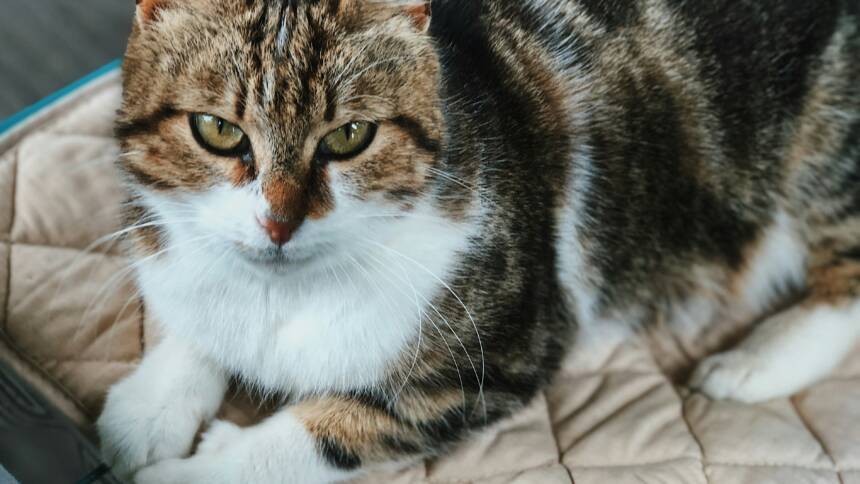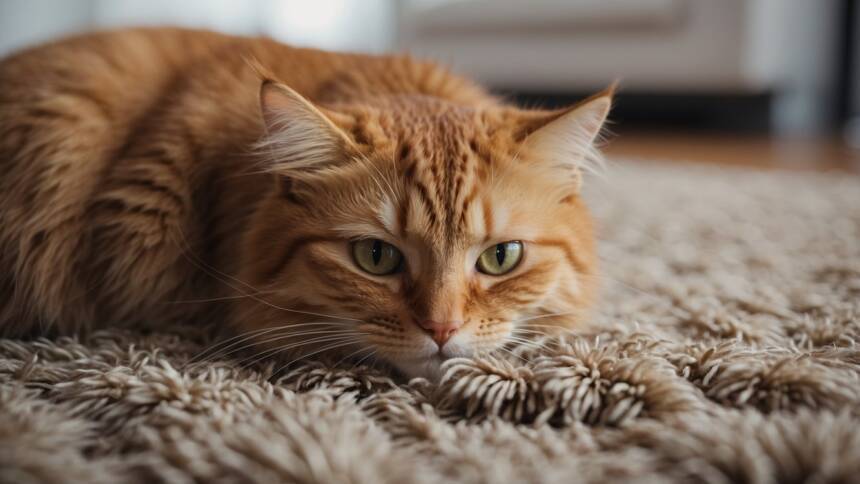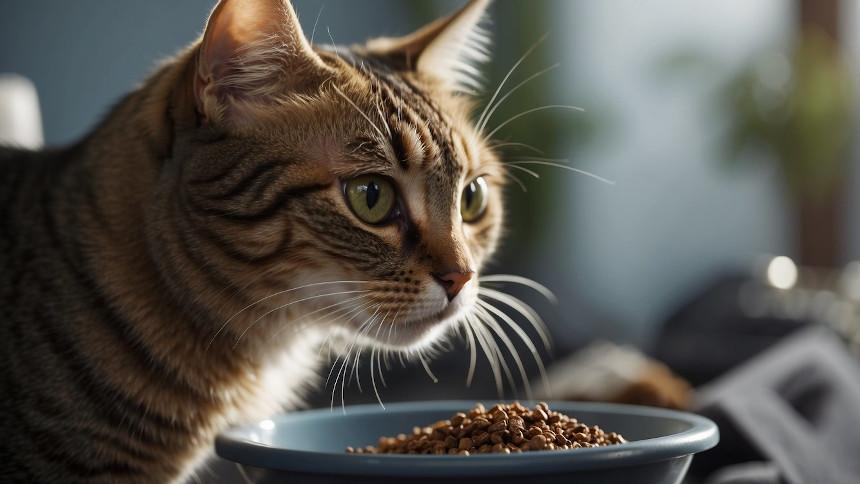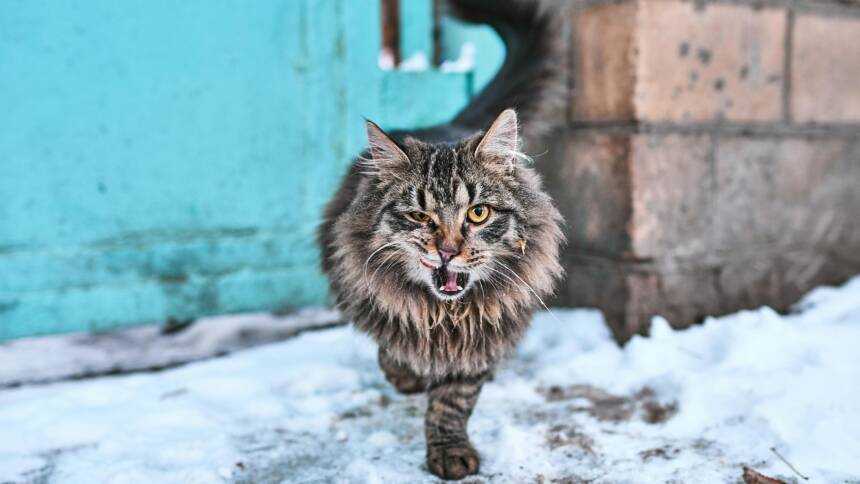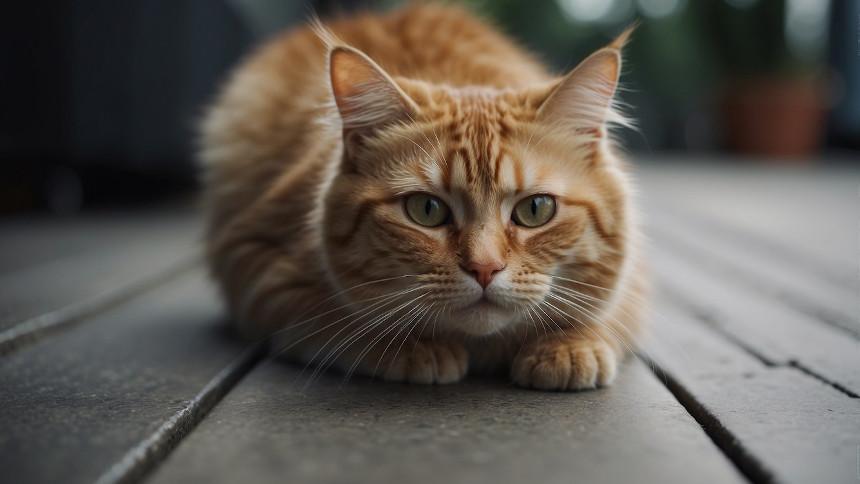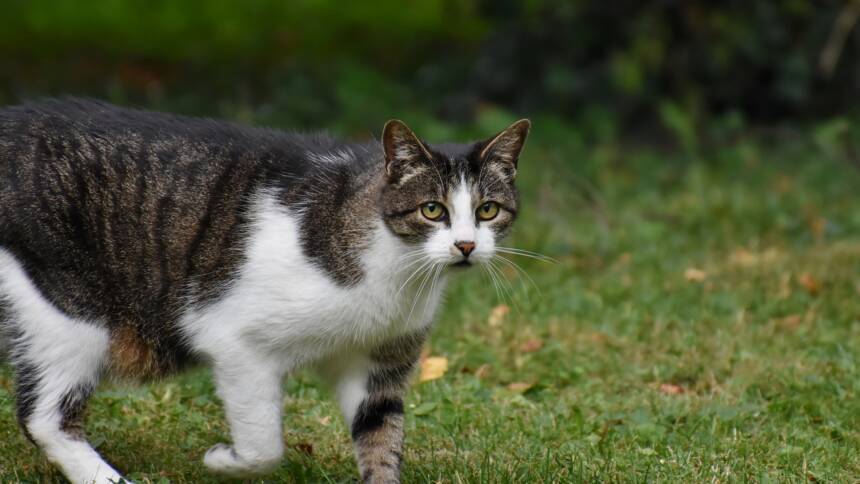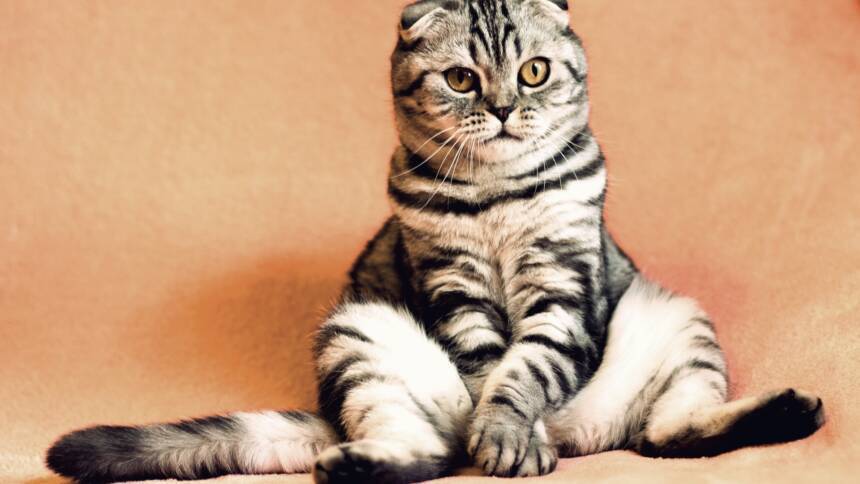Chronic diarrhea in cats is not just an acute bout of gastrointestinal upset; it indicates a prolonged issue that requires attention. When a cat experiences diarrhea for an extended period, typically more than three weeks, it is vital to investigate the underlying cause. A healthy cat’s digestive system is quite resilient, yet persistent diarrhea suggests an imbalance or illness that could compromise the cat’s overall health. Symptoms to monitor include changes in the stool’s consistency, frequency, and appearance, as well as any signs of discomfort or distress in the cat.
Understanding chronic diarrhea involves recognizing how it may vary from occasional loose stools. While an isolated incident may be tied to dietary indiscretion or a minor upset, ongoing diarrhea can be symptomatic of more serious conditions. These could range from intestinal parasites and bacterial infections to food allergies or intolerances, and even more complex gastrointestinal diseases.
Addressing chronic diarrhea in cats effectively requires identifying the precise cause, which can be challenging. Veterinary intervention is essential, as prolonged diarrhea can lead to dehydration and nutrient malabsorption. The vet may suggest diagnostic tests, dietary changes, probiotics, or specific treatments, depending on the etiology. A tailored approach considering the cat’s unique health profile offers the best prognosis for restoring digestive health and maintaining the cat’s well-being.
Understanding Cat Diarrhea
Diarrhea in cats is the passage of loose or liquid stools, often more frequent than normal bowel movements. Symptoms can include an increased volume or frequency of feces, a change in the color or consistency, and occasionally an urgency to defecate. It is important for cat owners to distinguish between acute and chronic diarrhea—the former happens suddenly and lasts a short time, while the latter persists for weeks or even months, indicating a deeper underlying issue.
Causes of diarrhea in cats can range from simple dietary indiscretions to more complex health problems. Here’s a summarized list of potential triggers:
- Dietary changes
- Food sensitivities
- Infections
- Inflammatory conditions
- Other systemic health issues
Chronic diarrhea is particularly concerning as it can lead to dehydration. Cats lose fluids and electrolytes when they have diarrhea, making hydration a top priority. Symptoms of dehydration include lethargy, dry mouth, and decreased skin elasticity.
Owners should monitor their cat’s hydration status closely and consult a veterinarian if chronic diarrhea is observed. The vet may perform various diagnostics such as fecal exams, blood tests, and imaging studies to determine the root cause. Early intervention can prevent more serious complications and guide appropriate treatment, maintaining the cat’s overall health and comfort.
Common Causes of Diarrhea in Cats
Persistent diarrhea in cats can be symptomatic of various issues, ranging from dietary mishaps to infections and chronic health conditions. Understanding these common causes is the first step toward addressing long-term feline diarrhea.
Dietary Issues
Cats may suffer from diarrhea due to dietary indiscretion—eating something they shouldn’t—or sudden changes in their diet. Introducing new foods can disrupt a cat’s digestive system, especially if the new diet is rich or does not align with their nutritional needs.
- Food Allergies: Can cause gastrointestinal upset, manifesting as diarrhea.
- Intolerances: Like humans, cats can have intolerances to certain ingredients found in cat foods.
Infections and Parasites
Infectious agents such as bacteria and viruses, or parasites like roundworms and giardia, are common culprits of diarrhea in cats.
- Bacteria: Certain types such as Salmonella or E. coli can lead to bacterial infections resulting in diarrhea.
- Viruses: Feline panleukopenia, coronavirus, and calicivirus are examples that may cause diarrhea.
- Parasites: Protozoan parasites such as coccidia or toxoplasma can also be responsible for digestive distress.
Underlying Health Conditions
Cats with chronic diarrhea might be suffering from an underlying health condition that requires medical attention. Conditions such as inflammatory bowel disease (IBD) or other systemic issues can present with diarrhea as a symptom.
- Inflammatory Bowel Disease (IBD): A condition characterized by chronic inflammation of the gastrointestinal tract.
- Toxins: Exposure to toxins, including certain plants, chemicals, or spoiled foods, can lead to serious gastrointestinal problems.
- Allergies: Apart from food, cats can also have allergies to their environment which might contribute to digestive issues.
Diagnosis and Evaluation
When a cat suffers from diarrhea for months, proper diagnosis and evaluation are crucial. A veterinarian will employ a multifaceted approach, combining a thorough physical examination with a set of diagnostic tests to determine the underlying cause of the prolonged symptoms.
Physical Examination
The veterinarian begins with a comprehensive physical examination to assess the cat’s general health and to check for any signs of dehydration, abdominal pain, or underlying conditions that might contribute to chronic diarrhea. They will evaluate the cat’s body condition and pay close attention to the abdominal region for any abnormalities.
Laboratory Tests
Laboratory tests are essential to the diagnostic process. A complete blood count (CBC) and chemistry panel can reveal infections, inflammation, or organ dysfunction. Fecal tests are performed to check for parasites, bacterial infections, and sometimes fungal organisms.
Blood work may include:
- Complete blood count (CBC): To screen for anemia, infection, and inflammation
- Biochemistry profile: To assess organ function, including the liver and kidneys
- Thyroid function test: If an overactive thyroid is suspected
- Fecal examination: To identify parasites or bacterial infections
Imaging Studies
Imaging studies, such as x-rays and ultrasound, allow the veterinarian to visualize the cat’s internal organs. An x-ray may detect obstructions, tumors, or other abnormalities within the abdominal cavity, while an ultrasound provides a more detailed view and can help diagnose conditions like Inflammatory Bowel Disease that might not be evident on x-rays alone.
These diagnostic tools help the veterinarian formulate a targeted treatment plan suited to the cat’s specific condition.
Treatment Options for Diarrhea
When a cat experiences prolonged diarrhea, a multifaceted approach is often required. This includes the careful selection of medications or antibiotics, stringent dietary management, and the application of home care remedies to effectively mitigate symptoms and address underlying causes.
Medications and Antibiotics
Cats with chronic diarrhea may benefit from specific medications or antibiotics to treat potential bacterial infections or intestinal parasites. A veterinarian might prescribe:
- Metronidazole or tylosin for their anti-inflammatory and antibiotic properties.
- Probiolike FortiFlora to maintain healthy gut flora.
Dietary Management
Dietary management is a cornerstone of treating feline diarrhea. Fundamental changes often include:
- Transitioning to a bland diet consisting of boiled chicken and rice or specially formulated gastrointestinal foods.
- Integrating a diet change by slowly introducing a novel protein source or hypoallergenic food.
- Probiotics may be recommended to replenish intestinal flora.
Home Care and Remedies
For cases of mild diarrhea, cat owners can provide supportive home care and remedies:
- Initiate fasting for 12-24 hours to rest the cat’s gastrointestinal system.
- Offer a small amount of baby food or a bland meal post-fasting.
Remember, it is critical to consult a veterinarian before starting any treatment regimen, especially if diarrhea persists for an extended period.
When to Seek Veterinary Care
When a cat experiences diarrhea for an extended period, such as a month, it is critical that the cat receives proper veterinary attention. Diarrhea can be symptomatic of a range of health issues, from minor discomforts to more serious conditions requiring medical intervention.
Persistent diarrhea is concerning for several reasons:
- Dehydration: A major risk associated with prolonged diarrhea is dehydration. This can have serious health implications for cats.
- Nutritional Deficiencies: Diarrhea can prevent the absorption of essential nutrients, leading to deficiencies and weight loss.
- Underlying Conditions: Chronic diarrhea may indicate an underlying condition that requires a veterinary diagnosis.
Symptoms accompanying diarrhea that necessitate a vet visit include:
- Vomiting: If a cat is both vomiting and experiencing diarrhea, this could signal a more serious health problem.
- Blood in Stool: The presence of blood in a cat’s stool is a red flag that warrants immediate medical attention.
- Lethargy or Weakness: A noticeable decrease in a cat’s energy levels or strength should be promptly investigated by a veterinarian.
It’s not advisable to wait when these signs are evident. Prompt veterinary care is often crucial in preventing complications and determining an effective treatment plan. A veterinarian may conduct various diagnostic tests, including but not limited to blood work, stool analysis, and urinalysis to identify the cause of diarrhea.
Cats rely on their owners to monitor their health and seek veterinary care when necessary. Timely vet intervention in cases of prolonged diarrhea is an essential aspect of responsible pet ownership and can greatly affect the outcome for the feline’s health.
Preventing Diarrhea in Cats
Maintaining proper hydration is essential in preventing diarrhea in felines. Pet owners should provide constant access to fresh water and consider wet food to increase fluid intake. Hydration helps maintain digestive health and can prevent loose stools caused by dehydration.
Nutrition plays a pivotal role in gastrointestinal health. A high-quality, balanced diet tailored to a cat’s life stage aids in preventing diarrhea. Gradual diet changes are crucial to allow the cat’s digestive system to adapt, reducing the risk of diarrhea. Introducing a new diet over a week, starting with a mix of approximately 25% new food to 75% old food, and progressively increasing the new food’s share is advised.
Including fiber in a cat’s diet, either through specialized cat food or supplements, can improve bowel regularity. The right amount of fiber can help form well-shaped stools and promote gut health.
Probiotics can also aid in maintaining a healthy balance of intestinal flora. These beneficial bacteria can be added to a cat’s regimen, especially when recovering from an episode of diarrhea or following a course of antibiotics.
Consistent preventative care, including regular veterinary check-ups, ensures early detection and management of conditions that could lead to chronic diarrhea. Such care also involves keeping up-to-date on vaccinations and parasite control, which are vital in preventative health strategies.
Managing a cat’s environment to minimize stress is essential, as stress can disrupt digestive function, leading to diarrhea. Strategies for stress reduction include creating a calm living space, offering hiding places, and providing enriching activities.
By adopting these dietary and lifestyle measures, owners can significantly reduce the chances of their cat developing chronic diarrhea, ensuring better overall health and well-being for their feline companions.
Recovery and Management
When managing a cat that has experienced diarrhea for an extended period, a multipronged approach focusing on hydration, diet, and stress reduction is imperative. Following a diagnosis from a veterinary professional, they usually outline a treatment plan tailored to underlying causes and subsequent recovery.
Hydration
A priority is addressing dehydration that often accompanies diarrhea. Owners should ensure their cat has continuous access to clean water. In severe cases, a veterinary professional might administer fluids intravenously or subcutaneously to correct electrolyte imbalances.
Nutrition
Adjusting the cat’s diet is also a crucial part of the management plan. Veterinarians typically recommend:
- A temporary shift to easily digestible foods
- Gradually reintroducing a normal diet over several days
- Incorporating probiotics to encourage a healthy gut flora
It is important to monitor the cat’s response to new foods and backtrack if diarrhea recurs.
Stress and Environment
Reducing stress levels can significantly aid recovery. Cat owners should:
- Maintain a calm environment
- Ensure the cat has a safe space to retreat to
- Avoid sudden changes in routine
Combining these elements also helps mitigate potential behavioral causes like constipation or lethargy by creating a supportive environment for recovery.
Owners should monitor their cat closely and report any persisting symptoms to their veterinarian to adjust the management plan as necessary. By adhering to professional advice and providing diligent care, recovery is typically achievable.
Complications and Associated Conditions
When a cat suffers from diarrhea for an extended period, it might be indicative of underlying health issues, which can lead to various complications and associated conditions if left untreated.
Chronic Conditions
Inflammatory Bowel Disease (IBD): IBD in cats is a group of disorders characterized by inflammation in the gastrointestinal tract, impeding proper absorption of nutrients and leading to chronic diarrhea.
- Cancer: Among the chronic conditions that can cause persistent diarrhea in cats is intestinal cancer, including lymphoma, which can disrupt normal bowel function.
Secondary Symptoms
Weight Loss and Protein Depletion: Prolonged diarrhea in felines frequently results in significant weight loss and loss of critical protein, creating a cycle of weakening the cat’s overall physical condition.
- Liver Disease: Continuous diarrhea can also be a sign of liver disease, which may not only affect the liver’s function but could also lead to noticeable changes in blood chemistry.
Systemic Effects
Spread of Infections: Diarrhea that persists over several months can sometimes be due to infections, which, without proper management, might spread and cause systemic effects.
- Overall Weakness: The loss of fluids and nutrients often seen in prolonged cases of diarrhea can contribute to a state of weakness and render the cat more susceptible to other illnesses.
